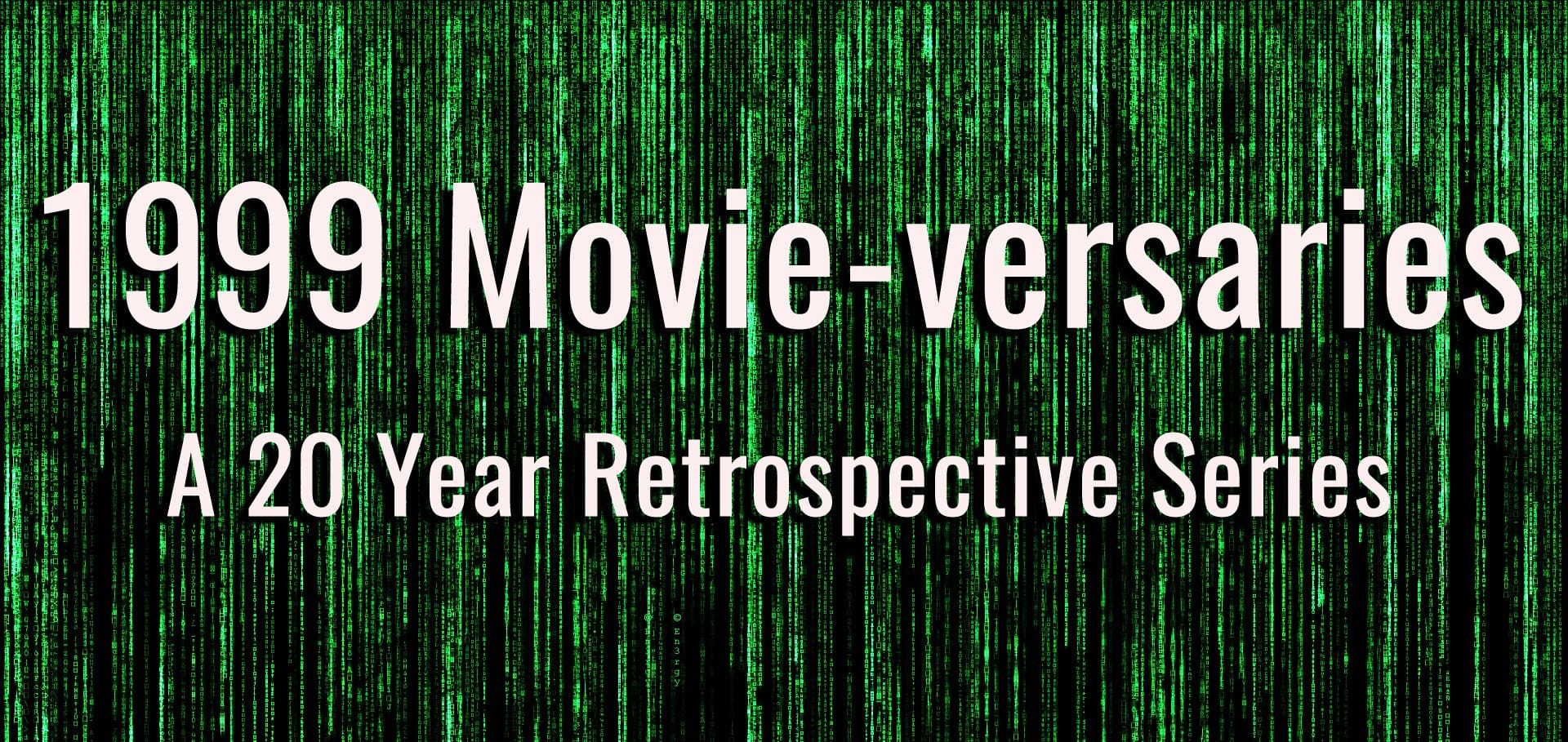1999 was a big year for movies. It was the year that The Matrix‘s slow-motion bullet influenced action movies for years to come. It was the year American Beauty won Best Picture at the Academy Awards and Oscar fans have been arguing about it ever since. It was the year Pokémon jumped from Gameboys and TV to the big screen. And worst of all, it was the year that disappointed a generation of Star Wars fans with the release of The Phantom Menace.
To celebrate that landmark year in film’s 20th Anniversary, The Pop Break continues its year-long retrospective of 1999’s most influential (at least to us) films with editor-in-chief Bill Bodkin reflecting on The Matrix.
The Matrix is the definitive movie of 1999.
The film might not have won Best Picture like American Beauty, or become a film that evokes wild emotions like The Phantom Menace, nor was it the stuff of late-night philosophical musings of “intellectually awoken” male college freshman like Fight Club. Yet, it’s still a film that had a massive, sweeping and immediate impact on those who watched and become part of the pop culture and just everyday lexicon.
How many times has the red pill/blue pill joke been made? How many times have you slipped into a bad Hugo Weaving impersonation when you meet someone with the last name Anderson? How many times have you heard someone reference “a glitch in The Matrix,” or “we’re living in The Matrix?”
Jokes aside, one of the reasons this film has stuck to the ribs for so long is its basis in technology. Yes, The Matrix is science fiction, but there’s something deeply unsettling here, and it’s unsettling because we can’t rule out the possibly that this film could actually happen. It’s much like Terminator 2: Judgement Day in that respect. Underneath all the guns (lots of guns), mammoth special effects, and white knuckle chase sequences, is a potentially horrifying glance into our future. What if technology turned against us, and enslaved us? Will it happen? Probably not. But can you rule it out completely? Well, that’s when the hairs on the back of your neck start to tingle and your mind goes down the rabbit hole of worry and possibility.
The Wachowskis, the writers and directors of the film, do an excellent job of taking this fear of technology and spin a fantastical take on the cyberpunk noir sub-genre. By 1999, this genre was pretty tired as theaters were littered with internet-driven cyber thrillers like Hackers, The Net, Virtuosity, and Johnny Mnemonic. However, what The Matrix did was stylize the holy hell out of its premise, melding the aesthetics of a classic noir with the techno-driven adrenaline of the cyberpunk genre. The Matrix‘s look and feel is absolutely iconic–retro cars, clothes, and architecture blended with sleek futuristic designs–obviously, but effectively symbolize the clash between humans and computers.
The action is what put all the butts in all those seats in 1999—mine included. The bullet time sequences–which were copied ad nauseam for years–blew us all away. The fight sequences between Neo (Keanu Reeves) and Morpheus (Laurence Fishburne), and Neo and the agents were everything we’d seen in anime and Jackie Chan films streamlined and revitalized into something words can barely describe. The final chase sequence is one of the all-time great chase scenes in film history.
Yet, what keeps us coming back for more is The Matrix‘s story. It’s about the potential doomsday fear of technology, it’s about faith (in a cause, in a person, in yourself), it’s about fighting against technology dumbing your senses to the evils around you, and it’s about man vs. machine—the stuff of great sci-fi.
Add on top of this an absolutely killer soundtrack, a breakout performances from Carrie-Ann Moss and Hugo Weaving, and career rejuvenating performances from Laurence Fishburne and Keanu Reeves (both who were in career slumps at that point), and you’ve got one hell of a movie. And not just a hell of a movie — an absolute classic.
It’s such a classic that the absolute bullshit sequels that followed did not do long-term, irreparable damage to them. In fact, had the film ended when Neo flies out a phone booth and into the sky to fight the machines (or so we’re meant to think), would’ve been absolutely perfect.
The Matrix changed the game in so many ways — not just in on Hollywood can produce a blockbuster, but it also changed my entire perception of movies. It changed how I thought about movies, what types of movies I wanted to watch going forward, and even briefly inspired me to want to do filmmaking.
The Matrix is one of the greatest films of the ’90s, and easily the best film of 1999. If you haven’t seen it, you need to stop everything you’re doing and go get your mind blown.



Comments are closed.